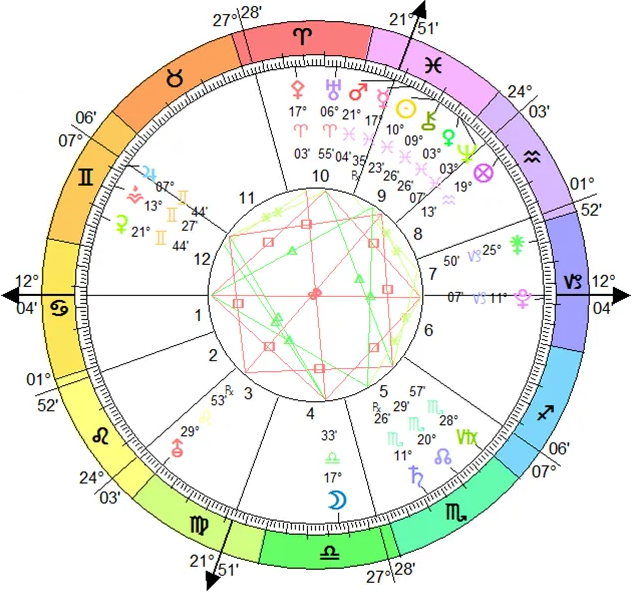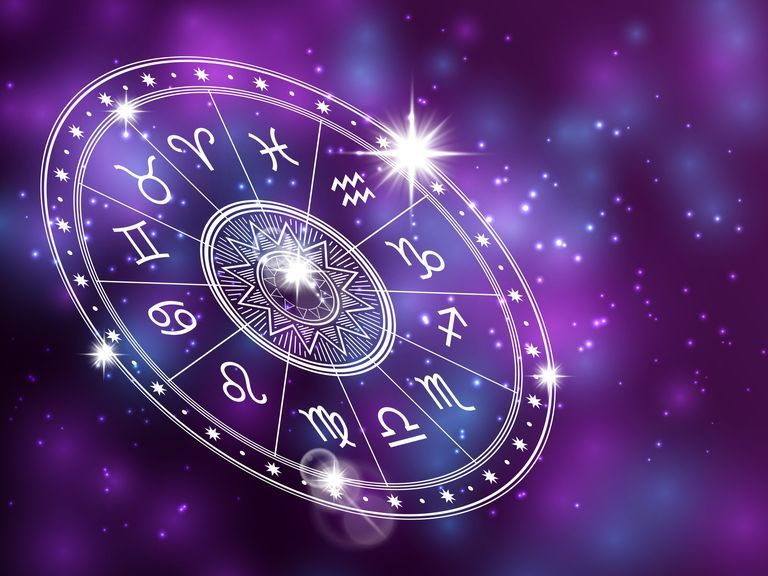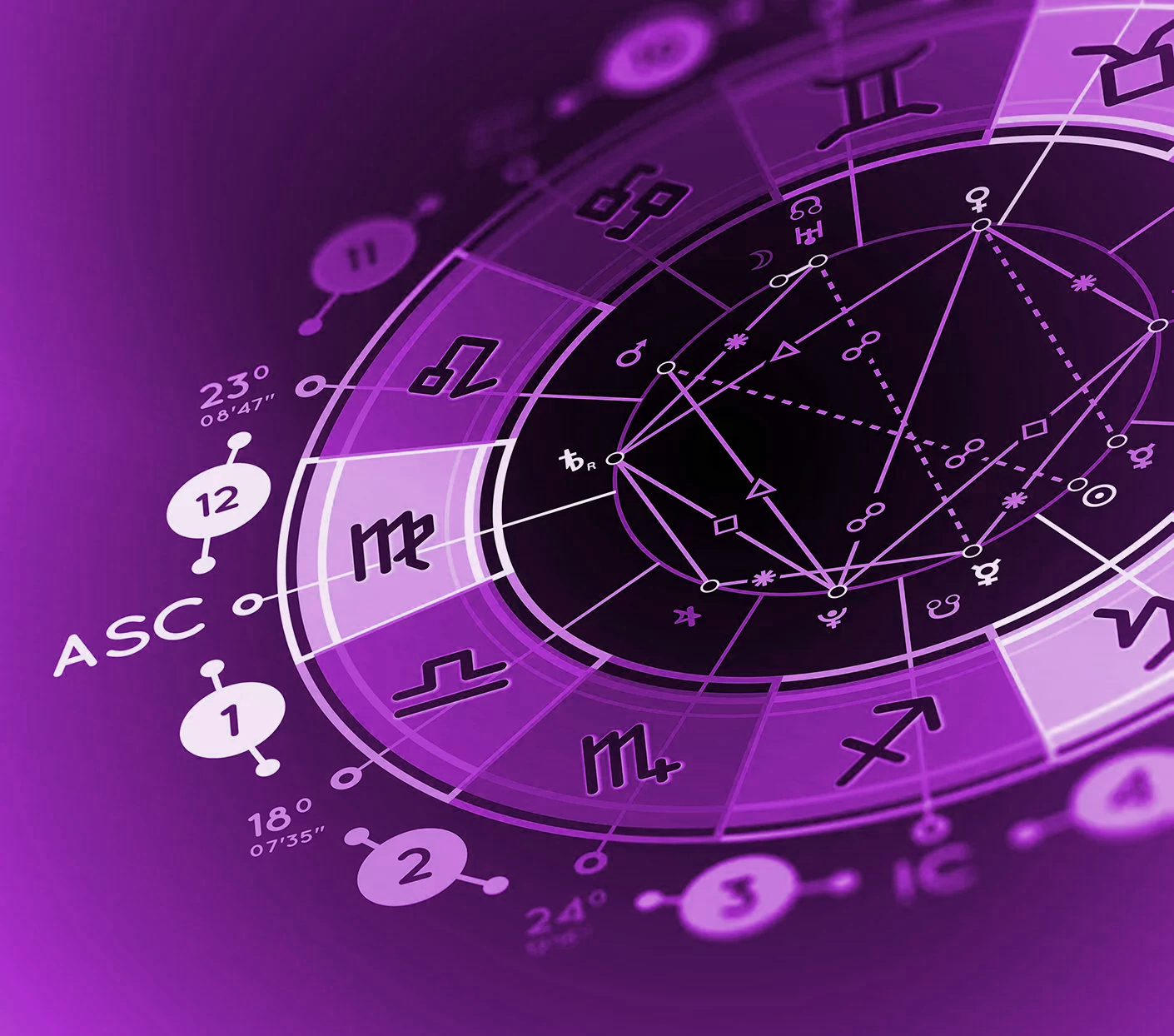
Decoding your natal chart can help you find out about yourself.
Though astrology is a vast, complex and highly specialized subject, the core principles are straightforward: A Birth or Natal chart is a snapshot of the sky at the moment of your birth. It records the location of each of the planets and which constellation they were in. In some charts all the planets are in the same constellation. In others they're spread across the signs. The distance between planets is important since each has its own celestial influence.
What does astrology have to do with the stars?
For centuries astrology was at the heart of science, medicine, philosophy, and magic. The axiom "as above - so below" signified the belief that the vast, mysterious macrocosm of the universe is a reflection of human experience. Though the function of astrology has changed (it's now more frequently used to gauge romantic compatibility than to predict the fate of the harvest) we still observe the planets as our ancestors did.
What does each planet represent?

☉ The Sun
When someone asks you what your sign is, whether or not they know it, they're asking about the position of the sun at your moment of birth. The sun symbolizes our fundamental essence. This vibrant celestial body represents our ego, sense of self, basic personality, and general preferences. The sun governs the zodiac sign Leo, the vivacious, dynamic fire sign that exudes both bravery and theatricality. It takes approximately one month to transit — or move across — a zodiac sign.
☽ The Moon
The moon's gravitational pull regulates the climate and oceanic tides. Within astrology, the moon represents our emotional inner world. While the sun exposes our outer experience, the moon symbolizes everything beneath the surface. It represents the spiritual retreat of our most private selves. The moon governs the zodiac sign Cancer, the sensitive, protective water sign that defines nurture, comfort, and security. The moon is the fastest moving celestial body in the sky and takes approximately two and a half days to transit a zodiac sign.
☿ Mercury
The smallest and innermost planet of the solar system, Mercury is named after the Roman deity who served as a messenger to the gods. Within astrology, Mercury symbolizes communication. While the moon reflects our emotions, Mercury reflects logic and rationality. Mercury uses its clever intellect and relentless curiosity to analyze, sort, and classify, helping us synthesize and articulate complex ideas. Mercury governs both air sign Gemini and earth sign Virgo, each representing a different side of Mercury’s expression: Gemini is output, while Virgo is input. Mercury takes 13 or 14 days to transit a zodiac sign and goes retrograde three or four times per year.
♀ Venus
Named after the enchanting Roman goddess, Venus is the vibrant planet that represents beauty, love, and money. Known in traditional astrology as a "benefic" (Jupiter is the other benefic), Venus boasts an auspicious influence. Indulgent Venus is happiest when luxuriating: Fine wines, extended baths, and aromatic moisturizers align with the Venusian spirit. Venus's highbrow tastes reflect our interest in art and culture, while its romantic sensibilities reveal our idealized perception of love. Both earth sign Taurus and air sign Libra are ruled by Venus, each representing a different side of Venus's expression: Taurus is physical, while Libra is cerebral. Venus takes approximately four to five weeks to transit a zodiac sign and goes retrograde every 18 months.
♂ Mars
The Red Planet is known for its battle cry. Named after the Roman god of war, Mars symbolizes action, determination, and aggression. Its impassioned spirit often manifests when we're racing to meet a deadline, running to catch a flight, or competing for a selective position. Mars is the fire under our ass, providing the adrenaline-charged boost of energy that fuels movement. It also reflects our physical passion and lust. This planet governs Aries, the impulsive fire sign known for its high-octane vivacity. Mars takes approximately six to seven weeks to transit a zodiac sign and goes retrograde every two years.
♃ Jupiter
The largest planet in the solar system, Jupiter — or Zeus, in Greek mythology — is recognized for its colossal presence. Referred to as the "Great Benefic" in traditional astrology, Jupiter symbolizes fortune, philosophy, abundance, and spirituality. This generous planet governs expansion, encouraging us to widen our scope and broaden our horizons through philosophy, spirituality, and education. Jupiter governs Sagittarius, the adventurous fire sign known for its thrill-seeking disposition. Jupiter takes approximately 12 to 13 months to transit a zodiac sign and goes retrograde each year for around 120 days.
♄ Saturn
The ringed gas giant is associated with time, regulations, and restriction. On a good day, Saturn symbolizes hard work, professional achievements, and steadfast resilience. On a bad day, however, Saturn can be harsh and unemotional, forcing us to learn through tough love and difficult challenges. Though this planet has an odd way of showing its affection, Saturn does have our best interest in mind. It simply wants us to play by the rules. Saturn governs Capricorn, the enterprising earth sign known for its tireless ambition, and takes approximately two and a half years to transit each sign. It goes retrograde each year for around 140 days.
⛢ Uranus
Uranus is unusual: It’s the first planet discovered by a telescope, the only celestial body named after a Greek deity, and is tilted so far on its axis that it essentially orbits the sun on its side. Fittingly, Uranus symbolizes technology, rebellion, and innovation. This revolutionary planet hates the rules and is always eager to facilitate groundbreaking, dynamic change. Uranus can have surprising effects (after all, the planet loves shock value). It governs Aquarius, the free-thinking air sign recognized for its eccentricity and nonconformity. Uranus takes approximately seven years to transit each sign and goes retrograde each year for around 150 days.
♆ Neptune
Neptune's vivid azure color perfectly complements its astrological significance. Named after the Roman god of the sea, Neptune governs the magical, mysterious vastness of the spiritual unknown. When a thick fog rolls across the ocean, it's difficult to discern the separation between the water and the sky. Similarly, Neptune's power exists at the intersection of fantasy and reality. On a good day, Neptunian energy is extremely creative and powerfully psychic. On a bad day, however, Neptune can become delusional and escapist. When Neptune's influence is felt, explore your imagination, but remember to throw down an anchor: You never want to get lost at sea. Neptune governs Pisces, the intuitive water sign recognized for its incredible imagination and psychic powers. The planet takes approximately 14 years to transit each sign and goes retrograde each year for around 150 days.
♇ Pluto
Though this icy celestial body didn't to measure up to the astronomical definition of a planet, by astrological standards, Pluto is still a really big deal. Pluto symbolizes power, transformation, destruction, and regeneration. Named after the Roman god of the underworld ("Hades," in Greek mythology), Pluto's power is rooted in darkness. This beguiling planet seamlessly slithers into complex infrastructures, quietly transforming systems from the inside. Pluto reminds us that in order for us to manifest change, we must release the past. It is associated with Scorpio, the elusive water sign defined by its mysterious disposition. Pluto takes approximately 14 to 30 years to transit each sign and goes retrograde each year for around 185 days.
